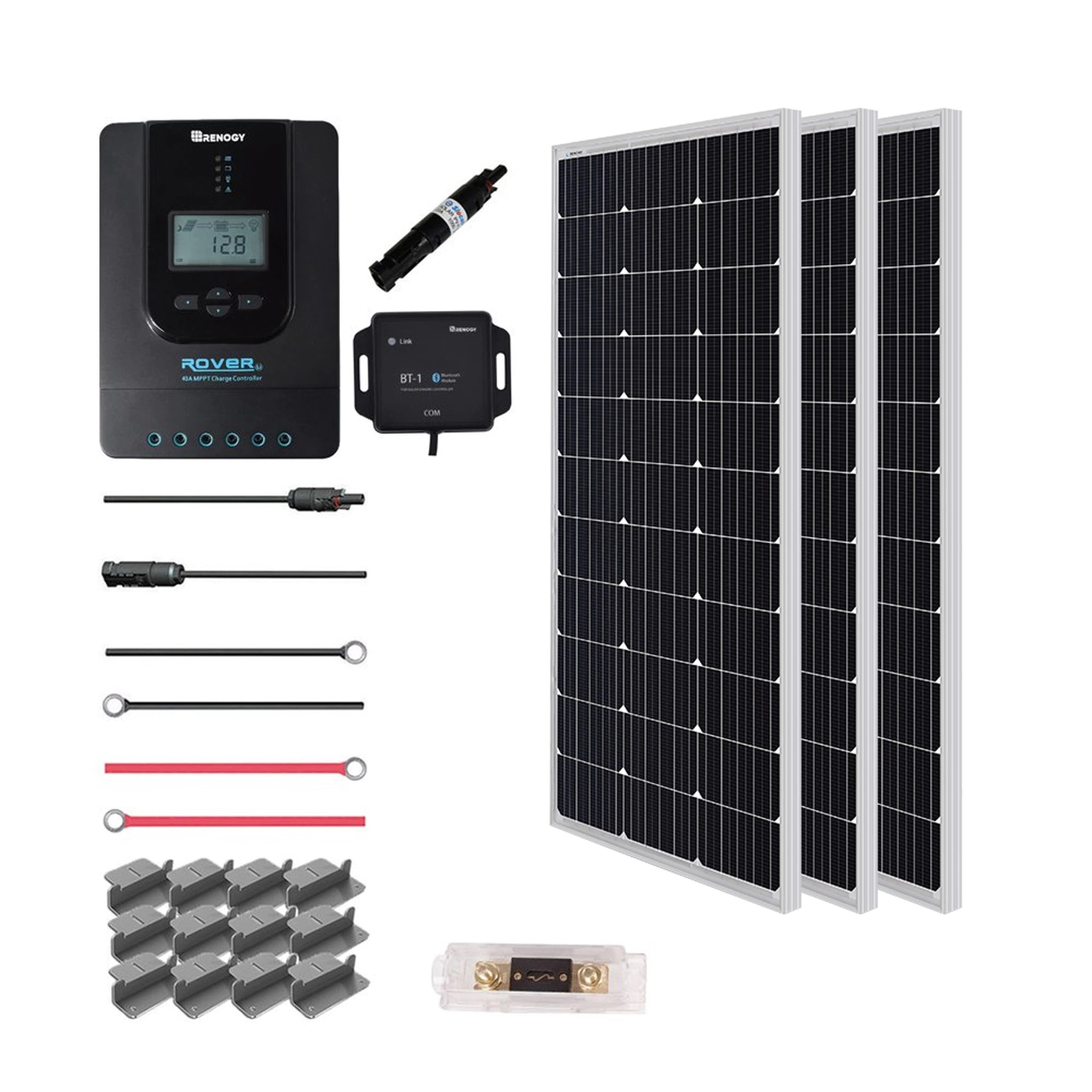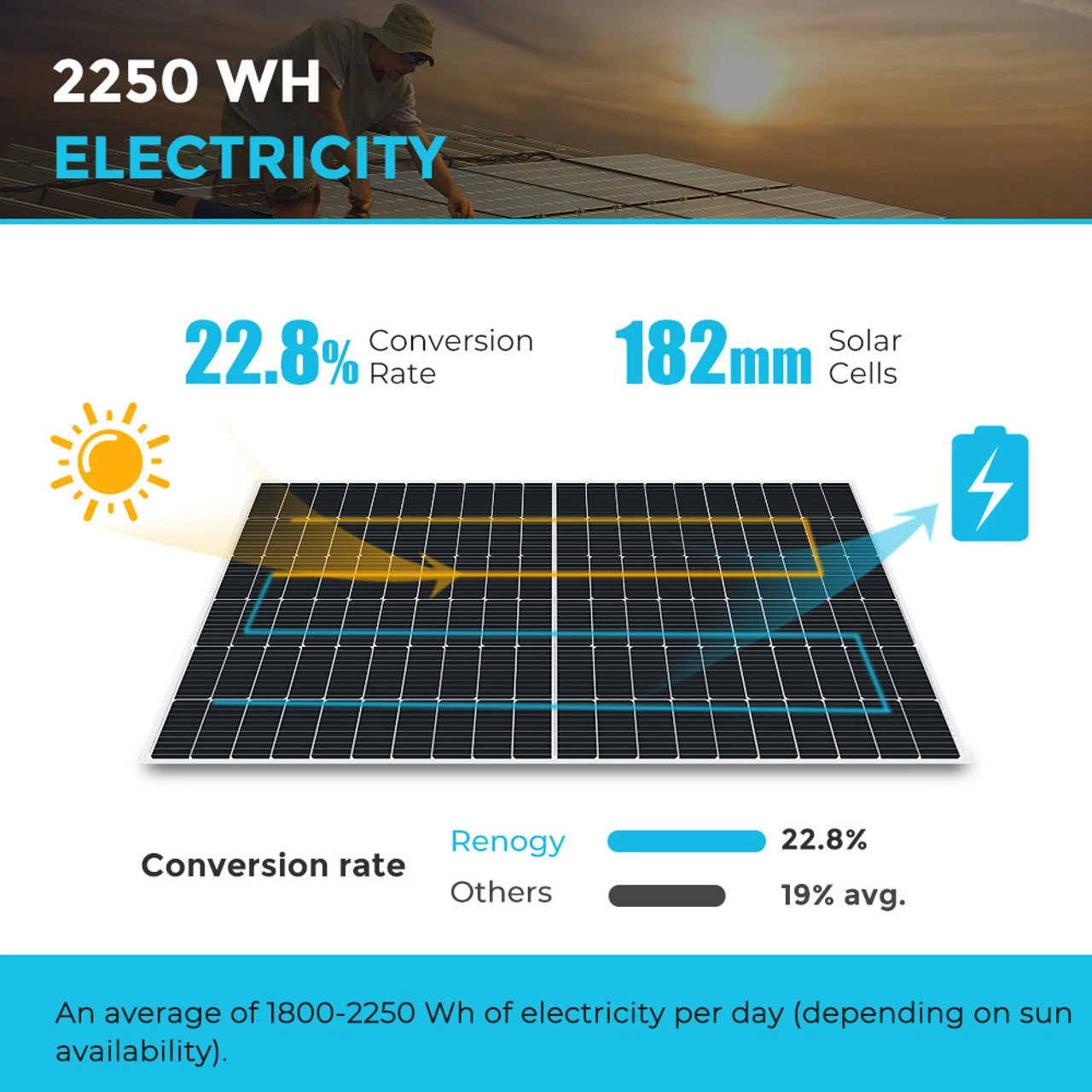Difference Between a Premium 400W & 800W Solar Panel Kit
A premium solar panel kit is an excellent way to get direct experience with solar energy. A 400W or 800W solar panel kit is ideal for off-grid systems, an emergency power backup option, or trickle charging batteries. Whether you are new to solar energy systems or looking to expand what you currently have, a premium solar panel kit is a great option.
Below are some of the benefits of investing in solar panel kits, along with when it’s best to use a 400W solar panel kit or consider an 800W solar panel kit. Let’s learn more about these power kits and what they include.
Benefits of a Solar Panel Kit
All solar power systems have the advantage of producing a renewable source of energy while offsetting initial costs relatively rapidly. However, investing in the world of solar can be a confusing or overwhelming commitment for some individuals, and that’s where solar panel kits come into play. These kits make setup and installation easy while still offering the same benefits as a more advanced solar panel system.
Efficient
The solar cells included in a solar panel kit are monocrystalline solar, making them high efficiency with a 21% conversion rate. In other words, they can convert 21% of the energy they absorb from the sun into electricity.
Reliable
All solar modules in Renogy’s solar panel kits are EL tested, meaning you won’t have to worry about hot spots on the panels. Also, the solar panels’ frames are corrosion-resistant aluminum, making them durable yet lightweight.
And not only will the frames last for decades, but the TPT backsheet also ensures a smooth, long-term performance for each kit. Plus, the junction box is IP65 rated, meaning it can protect against low-pressure water jets and environmental particles.
Safe
You won’t have to concern yourself with overcharging, overloading, short-circuiting, or reversed polarity due to the protection components built into each kit’s design. These features will keep battery chargers and inverter chargers safe and sound.
Intuitive
Regardless of if you hook up your small solar panel kits to sealed, gel flooded, or lithium-ion batteries, the charging algorithm will recognize your battery type and adjust accordingly. In addition, these starter kits utilize a four-stage charging process to ensure rapid and safe battery charging.

Who Is a Solar Panel Kit Right For?
A 400W solar panel kit or an 800W solar panel kit can provide efficient solar power to a number of home or business applications. The kits are most convenient for off-grid purposes, such as a tiny home solar setup, RV, boat, trailer, or small cabin. Most of your energy needs will be met with off-grid solar panel kits without the upfront cost of solar panel installation because you can install them yourself with a bit of background information and proper instructions.
Solar panel kits aren’t just for the road, though. They are also a viable option as home solar panel kits for solar beginners. The various foolproof features and included materials make setting up the equipment straightforward. Also, it’s relatively easy to mount the kits using the provided mounting hardware.
Another excellent application for solar panel kits is to use them to expand on your existing system. If you’ve already installed solar panels in your home or business and need more power, adding a solar panel kit to your setup is a simple way to get the additional electricity you need without breaking the bank.
How Much Can a 400W Solar Panel Power?
As with all solar panel systems, the amount of energy a 400W solar panel kit can produce depends on various factors, such as the number of sunlight hours, geographic location, and the panels’ tilt. However, in general, you can expect a 400W solar panel kit to produce somewhere between 1.2 and 3 kilowatt-hours (kWh) of energy per day.
That amount of kWh can provide you enough energy to power a fair number of items. For instance, on a day when your panels receive four hours of direct sunlight with an MPPT charge controller, you can expect to have sufficient energy for the following:
- A decent-sized, energy-efficient fridge
- A solar inverter for a TV and laptops
- LED lights
- Operating vents and fans in an RV or tiny home
- Recharging small devices like cell phones, e-readers, and tablets
- Running a diesel heater for a couple of hours
Keep in mind that if you are utilizing all of the above on a daily basis and want to recharge your solar system’s batteries, you may not be able to do so as quickly as you’d like. However, fully charged batteries can give you a couple of days of leeway if you run into poor weather conditions or other issues.
What Is Included in the 400W Solar Panel Kit?
All of Renogy’s kits include solar panels, of course. In the case of a 400W solar panel kit, that means having four 100W monocrystalline panels. In addition, our 400W solar panel kits come with three solar Y branch connectors, mounting Z brackets, a 20-foot 10AWG solar adaptor kit (A pair), eight feet of 10 AWG tray cables (A pair), and a Renogy Wanderer Li30A PWM charge controller.
If you’re considering ground mounting your solar panels, you can still use the provided Z brackets to attach the solar panels to whatever surface you plan to use for your DIY solar project.
How Many Batteries Do I Need for a 400-Watt Solar System?
As long as your battery bank can store at least 200Ah (amp hours), you could utilize anywhere from one to four batteries. In other words, if you purchase a 1 kWh battery that can manage 200Ah, you’ll just need that one battery. However, if you’re looking at batteries that only produce 50Ah, it would be best to purchase four of them and connect them in a series or parallel.
Remember that batteries store direct current (DC) energy, while some larger appliances, such as refrigerators, use alternating current (AC) energy. Connecting a solar inverter to your system will take care of this compatibility issue.

How Much Can an 800W Solar Panel Power?
Again, considering fluctuating factors such as sunlight hours, panel tilt, and geographic location, an 800W solar panel kit can produce around 240 - 256 amp-hours per day, or 3 to 4 kWh daily.
With that amount of energy, you can expect to power:
- A large, energy-efficient fridge
- A solar inverter for a TV, coffee maker, and laptops
- LED lights
- Operating vents and fans in an RV or tiny home
- Recharging small devices like cell phones, e-readers, and tablets
- Running a diesel heater for a couple of hours
The main advantage of an 800W solar panel kit over a 400W solar panel kit is that the larger kit allows you to store more backup energy. This increase in storage power makes 800W solar panel kits perfect for more long-term camping or traveling, even in wintertime.
What Is Included in the 800W Solar Panel Kit?
The 800W solar panel kit comes with many of the same materials as the 400W solar panel kits, such as the mounting Z brackets, solar Y branch connectors, and 20-foot 10 AWG AK. Additionally, the 800W solar panel kit comes with a total of eight 100W panels, a Rover Li 40A MPPT charge controller, two-foot 8 AWG fuse cable, eight-foot 8 AWG tray cable, 20A in-line fuse, and 40A ANL fuse, and a BT-1 Bluetooth module.
How Many Batteries Do I Need for an 800-Watt Solar System?
Because you will want your 800W solar system to manage at least 300 - 360Ah of battery, using two 12V batteries would be the minimum. Just like with a 400W solar panel kit, if you want to store more energy for later use, you can connect more batteries to your solar energy setup. If you need a steady supply of electricity during the day and in the evening, for example, running a heater at night, having four batteries is the best decision.
Summing Up Solar Panel Kits
Renogy’s premium solar panel kits are a great choice for people looking to try their hand at solar energy or for those who want a more flexible option for traveling. These kits are easy to set up, and you can depend on them for their efficiency, safety, and intuitiveness.
When it comes to deciding between a 400W solar panel kit or an 800W solar panel kit, you’ll really want to determine your planned energy usage for your situation. Renogy’s Solar Panel Calculator is super helpful when calculating energy use for specific appliances, such as blow dryers, laptops, LED lights, refrigerators, to name a few.
Once you know how much energy you need, deciding between a 400W solar panel kit or an 800W solar panel kit should be fairly straightforward.
In the end, if you have doubts or concerns about which solar panel kit to choose, we recommend the 800W option. This kit ensures you can always get the energy you need to stay comfortable and content.
See other related articles to learn more:
Solar Panels 101: A Beginner's Guide
The Ultimate Guide To DIY Off-Grid Solar Systems
Do solar panels increase home value
how efficient are solar panels
How Many Solar Panels Do I Need








